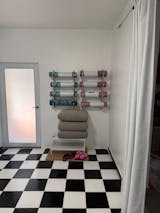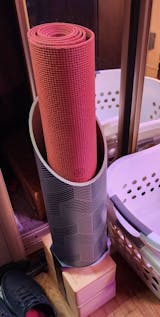If there is one thing that every individual has collectively learned throughout this pandemic, resilience and the ability to embrace change are two of the most important survival skills one can possess.
From families being separated for years, millions facing the loss of loved ones, and careers coming to a screeching halt, 2020 forced everyone to completely change their lives from one day to the next. We didn't have a choice, left to sort out our next moves and contemplate our ability to adapt to a new world and way of doing things.
The Power of Resilience
As countries around the world started to put strict lockdown restrictions into place our options to maintain a normal lifestyle were limited within the 4 walls that surrounded us; our homes. Many of us turned to technology opting for zoom meetings or events, WhatsApp phone calls with friends and family, Netflix for entertainment, and endless apps for online yoga classes or workouts to stay in shape.
According to a survey conducted by Jenni Rawlings of 659 yogis, “Before the pandemic, about 40% of the students surveyed did report practicing online yoga. Conversely, only 9% of teachers taught online before the pandemic. During the pandemic, the percentage of students and teachers engaging in online soared to 91% and 86%”. The fact that 77% of yoga instructors started teaching online during the pandemic is a sign of the impressive resilience of the yoga industry and its ability to embrace change and quickly adapt.
Technology wasn’t the only industry that became a critical part of our pandemic lives. Our physical environment began to grow in importance with millions assessing their home self-care spaces and investing in upgrades. According to Comscore, the retail home furnishings category sites saw an increase of +26% from February to May 2020 setting a record at 133 million U.S. unique visitors in May 2020.
Being a wellness and home decor brand ourselves, Mache was one of the fortunate brands that managed to adapt quickly and empower individuals to elevate their home wellness spaces with eco-friendly yoga mat storage solutions. We know first hand the power of resilience and embracing change.

The Three Steps to Embrace Change
Step One: Awareness
With so much noise around us all the time it can feel impossible to hear ourselves think. From the very start of our days, we are surrounded by technology that fills our minds with shocking news, social media images, time-consuming videos, loud music, and streaming television shows that never seem to end. To make any type of change in your life you must first be aware that this change is needed by giving yourself the time and space to think, feel and be present.
Make this practice a routine each day, week, or month creating the space to reflect on your current life, career, surroundings, relationships, and health. Start by identifying the areas in your life that are most important to you, which you value the most. Write them down in a journal and use them as your focal point to reflect on the specific things in each area that bring you the most happiness or the most pain.
Discover how to align action and word to live by your values.
Begin your awareness practice with a quick meditation to ground yourself and allow your mind to be in the present moment. Next, write down the best & worst things about each area of your life. Identify the biggest pain points you are struggling with and take these with you to the next step, adapt.
Step Two: Adapt
In this step, we will use the biggest pain points that were identified in the awareness step above. Armed with knowledge and awareness, we are now able to focus on finding ways to improve our lives while adapting to our current external circumstances. Use the same journal from step one and focus on one pain point at a time. Start by answering the following questions for each pain point:
- What is your pain point?
- Example: Maintaining a workout routine is my top health pain poin
- Why does this cause you pain?
- Example: When I go many days without working out I have low energy, low self-esteem and notice poor eating habits
- What has prevented you from solving this pain?
- Example: I was ill at the beginning of the year and stopped all exercise but have not been able to return to my local gym due to lockdowns in my area.
- What is the trigger for you to start feeling pain?
- Example: By the end of the weekend I notice low energy and a poor attitude due to overeating and lack of exercise.
- What is not in your control to fix this pain?
- Example: My local gym is still closed and group yoga and pilates classes are either not available or have too many restrictions.
- What is in your control to fix this pain?
- Example: I could join an online workout class and take it at the same time/day each week and weekend with friends to have accountability and balance
In the final step, evolve, you will ingrain these new solutions into your daily life to allow you to feel more resilient and in control of your life. If you feel unable to find ways to fix this pain on your own there are endless resources at your disposal to help provide guidance and clarity from a different perspective.
Using technology can be a great way to start solving your main challenges, here is a list of 20 helpful apps and tools to achieve your goals. You can also look for a life coach or business coach that is experienced in your specific industry. To get the help of a licensed counselor, BetterHelp is a great place to start, which offers affordable and remote therapy to people around the world. When facing a large problem we need a large solution and working with a trained professional can be just the thing we need to improve our lives.
Step Three: Evolve
The final step to building resilience and embracing change is to evolve. Ideas and solutions to problems require action and follow-through to become a valuable asset in your life. Every individual is motivated by different drivers, which are key to achieving long-lasting change and adaptation.
To help you make these solutions stick in your life, it is crucial to understand how you are motivated and what drives your behaviors. There is a motivation framework created by Gretchen Rubin called the Four Tendencies, in summary, the four tendencies are:
- Rebels want the freedom to do something their own way.
- Upholders want to know what should be done.
- Questioners want justifications.
- Obligers need accountability.

You can take the quiz to determine your motivation tendency here. Once you determine the drivers for your actions you can use it to your advantage and put processes in place to succeed. If you are an obliger then you can create an accountability group to check in every couple of weeks and help encourage others. If you are an upholder then simply scheduling time each week to review your progress and plan out your goals for the next week could be enough to make the new solutions stick. Rebels will need to make sure the solution they’ve chosen is right for them and questioners will need to do the research required to ensure their solutions make sense for their goals.
No matter your tendency, it is important to give yourself space to adapt without expecting immediate perfection while celebrating the small wins along the way. Everyone has been forced to overcome extreme circumstances during this past year, we have shown our resilience in one way or another, and celebrating this will only help encourage us to continue in the right direction.
How to remain in control
“The green reed which bends in the wind is stronger than the mighty oak which breaks in a storm.”
― Confucius
This past year surely has proven this Confucious quote to be painfully true. The companies, which have survived the pandemic have been able to bend in the wind and adapt to the constantly changing circumstances while continuing to bring value to their community. We all know that nothing is constant in life but change so the sooner we build resilience the sooner our quality of life will improve for the long run.
We will never be in control of all our external circumstances but we are always in control of our response to these circumstances. Yoga and meditation are two highly impactful practices that can help you to not only build resilience but adopt new habits into your lifestyle by increasing awareness and living in the present moment. Our newfound resilience and adaptability will be the most valuable souvenir we’ve ever picked up from this pandemic experience.
Discover How To Invest In Self-Care And The Wellness Of Others.



















